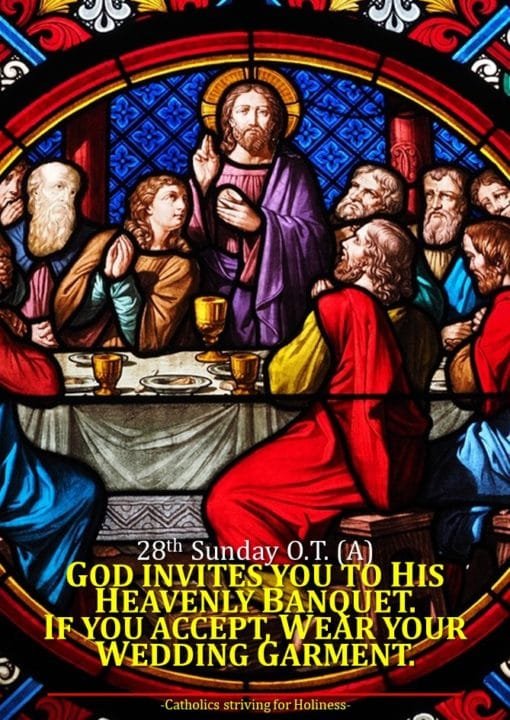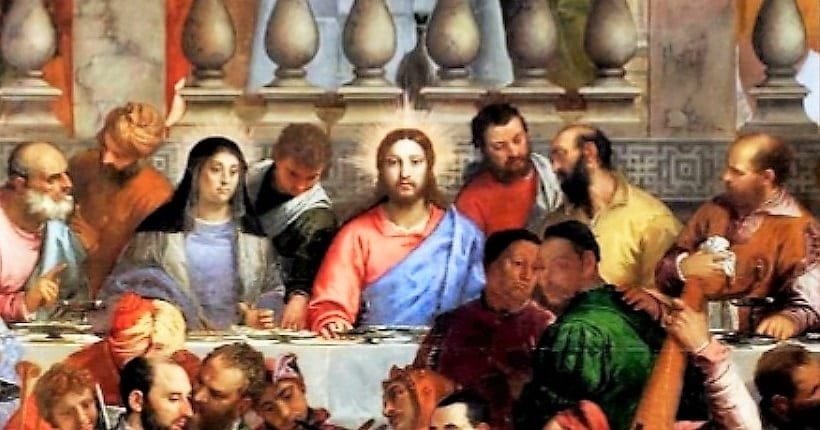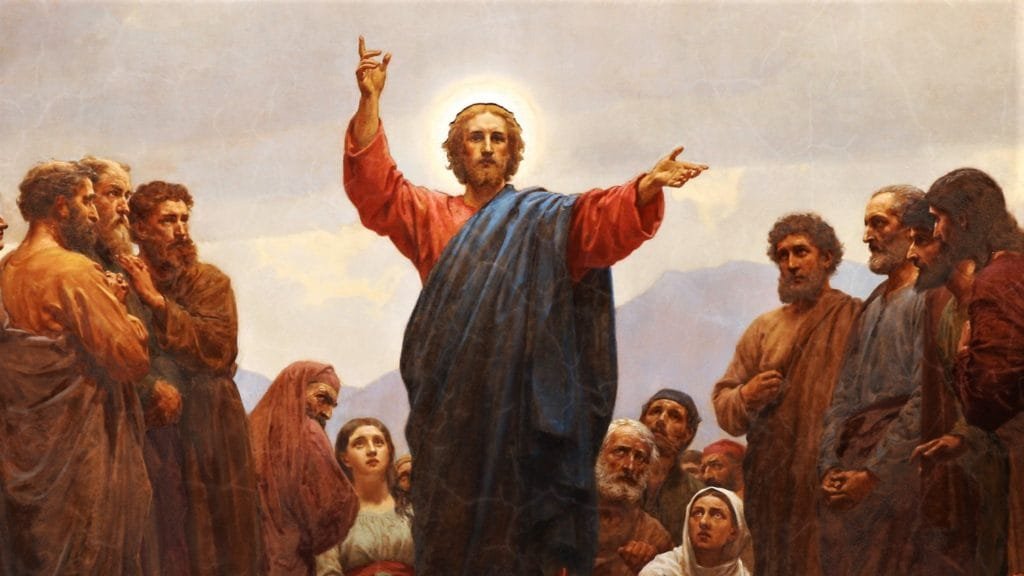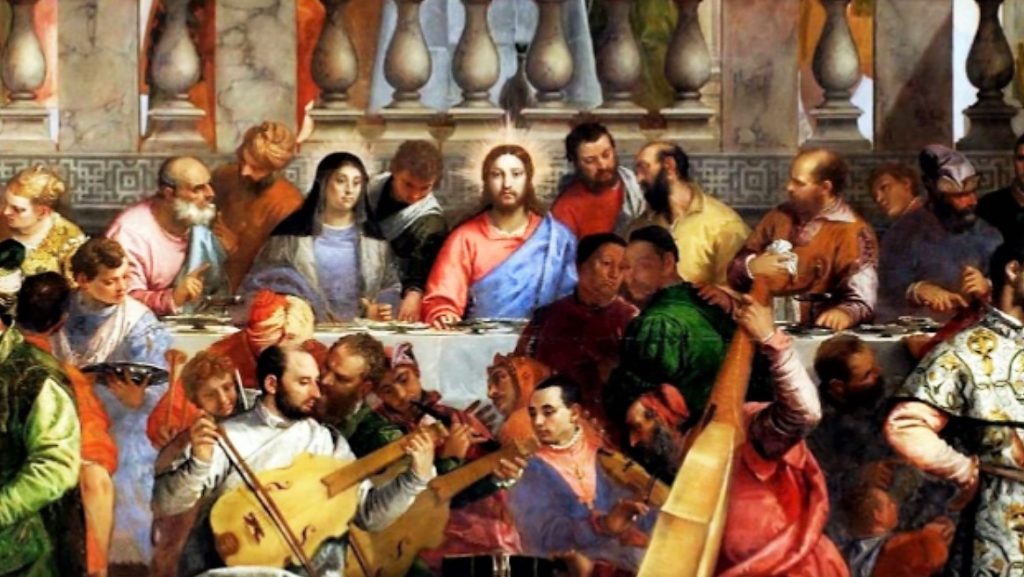HOMILY FOR THE 28TH SUNDAY IN ORDINARY TIME YEAR A
GOD INVITES YOU TO HIS HEAVENLY BANQUET BUT WEAR YOUR WEDDING GARMENT.

OUTLINE
- Summary of ideas of today’s Sunday readings
- The Parable of the Wedding Feast: God’s invitation, man’s freedom and the proper dispositions to enter God’s heavenly banquet.
- Are we always dressed with our heavenly wedding garment?
1. Summary of ideas of the 28th Sunday in Ordinary Time year A readings
Today’s 28th Sunday in Ordinary Time year A liturgy encourages us to contemplate the final destiny to which God calls us: the eternal joy of heaven.
- It uses the symbol of the wedding feast prepared by the Lord to wipe the tears from all faces (1st reading, Isaiah 25:6–10a)
“On this mountain the Lord of hosts will provide for all peoples a feast of rich food and choice wines, juicy, rich food and pure, choice wines. On this mountain he will destroy the veil that veils all peoples, the web that is woven over all nations; he will destroy death forever. The Lord God will wipe away the tears from every face.”
- This idea is reinforced in the Gospel (Mt 22:1–14) where Our Lord presents the parable of the wedding banquet to which we are all invited. Nevertheless, the parable also reveals that in spite of the fact that God desires the salvation of all men — the banquet is the Kingdom of heaven —, man could freely accept or reject God’s invitation.
- We have to ask ourselves if we are those who, with our way of life, we are rejecting that invitation.
- The acceptance of God’s invitation has its conditions
- We must have the proper dispositions symbolized by the wedding garment which God expects from his guests to be in His presence. This means to dress ourselves with Christ’s love and life, a task which is not easy and requires His grace and our lifelong struggle, but convinced that “I can do all things in him who strengthens me. Still, it was kind of you to share in my distress. My God will fully supply whatever you need, in accord with his glorious riches in Christ Jesus.(2nd reading, Philippians 4:12–14, 19–20)”
- Those who do not prepare themselves will have the same destiny as those who rejected his invitation.
- We are still in time to change and clothe ourselves with the grace of God in order to participate in the Eucharist which, celebrated with love, brings us to the glory of heaven (Prayer over the offerings), the house of the Lord, where we shall live all the days of our life. (Cfr. Responsorial Psalm).
2. The Parable of the Wedding Feast: God’s invitation, man’s freedom, and the proper dispositions to enter God’s heavenly banquet.
In this parable Jesus reveals how intensely God the Father desires the salvation of all men — the banquet is the Kingdom of heaven — and the mysterious malice that lies in willingly rejecting the invitation to attend, a malice so vicious that it merits eternal punishment.
“The kingdom of heaven may be likened to a king who gave a wedding feast for his son. He dispatched his servants to summon the invited guests to the feast, but they refused to come. A second time he sent other servants, saying, ‘Tell those invited: “Behold, I have prepared my banquet, my calves and fattened cattle are killed, and everything is ready; come to the feast.”’ Some ignored the invitation and went away, one to his farm, another to his business. The rest laid hold of his servants, mistreated them, and killed them. The king was enraged and sent his troops, destroyed those murderers, and burned their city.”
- Indifference, love of comfort, selfishness, disordered attachment to worldly affairs, and hostility cause us to reject God’s loving call and therefore to suffer condemnation.
- We need to respond faithfully to the call we have received and possess the proper dispositions to attend it; otherwise, we will suffer the fate of being cast “into outer darkness”. As St. Gregory the Great wrote Great (In Evangelia homiliae, 36):
“The marriage is the wedding of Christ and his Church, and the garment is the virtue of charity: a person who goes into the feast without a wedding garment is someone who believes in the Church but does not have charity”.
- Charity is none other than the love and union with God which one has when in the state of grace, that is, in God’s friendship. The wedding garment signifies the dispositions a person needs for entering the Kingdom of heaven.
- Even though a person may belong to the Church, if he does not have these dispositions he will be cast outside God’s banquet during his particular judgment.

“when the king came in to meet the guests, he saw a man there not dressed in a wedding garment. The king said to him, ‘My friend, how is it that you came in here without a wedding garment?’ But he was reduced to silence. Then the king said to his attendants, ‘Bind his hands and feet, and cast him into the darkness outside, where there will be wailing and grinding of teeth.’ Many are invited, but few are chosen.’”
- These words in no way conflict with God’s will that all should be saved (cf. I Tim 2:4). Each of us can assert with the Apostle that Christ “loved me and gave himself for me” (Gal 2:20). However, God in his infinite wisdom respects man’s freedom: man is free to reject grace (cf. Mt 7:13-14).
3. Are we always dressed with our heavenly wedding garment?
People always dress appropriately according to the occasion: for work, for parties, for Holy Mass…and so on. Let us remind ourselves that the most important occasion of our existence will be our particular judgment which occurs immediately after death when each person will be judged according to his works (Cf. Mt 16:27; Rom 2:6; 2Cor 5:10; Rev 22:12).
Dear brethren, let us ask ourselves if we are properly disposed to accept God’s invitation to His heavenly banquet. While there’s life, there’s still time to undress ourselves of the filthy garment of our sins and wretchedness, through the Sacrament of Confession, and put on the white garment of God’s love and grace with which we have been clothed during our Baptism, thus restoring our union and friendship with God.
Let us also begin again and again to live Christ’s life, a life motored by love, which is the necessary requirement if we are to enter God’s heavenly banquet, for “at the end of the day,” as St. John of the Cross said, “we will be examined in love”.
“May your grace, O Lord, we pray, at all times go before us and follow after, and make us always determined to carry out good works. Through our Lord. (Opening prayer).”
FOR THE 28TH SUNDAY IN ORDINARY TIME YEAR A 2023 MASS PRAYERS AND READINGS, CLICK HERE.
Stay updated: subscribe by email for free TO OUR NEW WEBSITE www.catholicsstrivingforholiness.org (PUT YOUR EMAIL IN THE SUBSCRIBE WIDGET).
We are also in www.fb.com/Catholicsstrivingforholiness. Kindly help more people in their Christian life by liking our page and inviting your family, friends and relatives to do so as well. Thanks in advance and God bless you and your loved ones! Fr. Rolly Arjonillo


